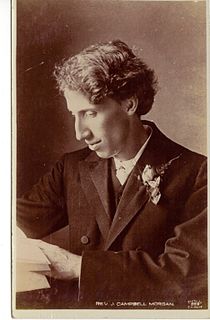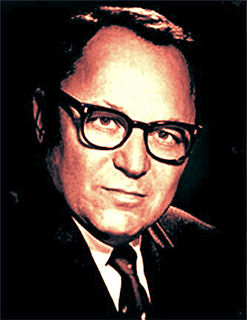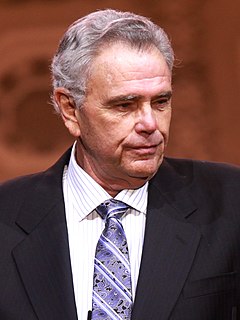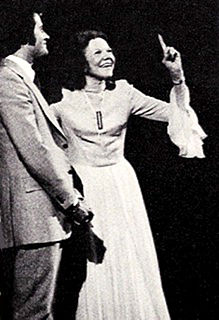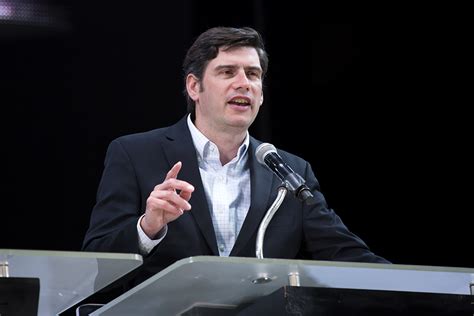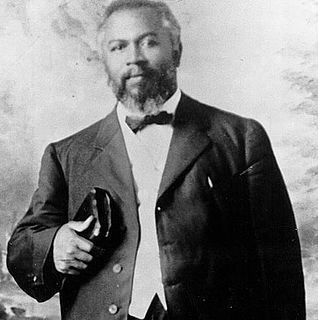A Quote by G. Campbell Morgan
A man's concept of God creates his attitude towards the hour in which he lives.
Related Quotes
[St. Francis] looked upon creation with the eyes of one who could recognize in it the marvelous work of the hand of God. His solicitous care, not only towards men, but also towards animals is a faithful echo of the love with which God in the beginning pronounced his 'fiat' which brought them into existence. We too are called to a similar attitude.
One of the proud joys of the man of letters - if that man of letters is an artist - is to feel within himself the power to immortalize at will anything he chooses to immortalize. Insignificant though he may be, he is conscious of possessing a creative divinity. God creates lives; the man of imagination creates fictional lives which may make a profound and as it were more living impression on the world's memory.
The essential in artistic creativity is victory over the burden of necessity. In art, man lives outside himself, outside his burdens, the burdens of life. Every creative artistic act is a partial transfiguration of life. In the artistic concept man breaks out through the heaviness of the world. In the creative-artistic attitude towards this world we catch a glimpse of another world.
A wrong attitude towards nature implies, somewhere, a wrong attitude towards God, and that the consequence is an inevitable doom. For a long enough time we have believed in nothing but the values arising in a mechanized, commercialized, urbanized way of life: it would be as well for us to face the permanent conditions upon which God allows us to live upon this planet.
Religion, as distinguished from modern paganism, implies a life in conformity with nature. It may be observed that the natural life and the supernatural life have a conformity to each other which neither has with the mechanistic life...A wrong attitude towards nature implies, somewhere, a wrong attitude towards God...[We should] struggle to recover the sense of relation to nature and to God.
What has here happened is that the instinct of cruelty, which has turned inwards, has become self-torture, and all man's animal instincts have been reinterpreted as guilt towards God. Every Nay man utters to his nature, to his real being, he flings out as a Yea, an affirmation of reality applied to God's sanctity
The world was created because God willed it, but why did He will it? Judaism has maintained, in all of its versions, that this world is the arena that God created for man, half beast and half angel; to prove that he could be a moral being...man was given dominion over nature, but he was commanded to behave towards the rest of creation with justice and compassion. Man lives, always, in tension between his power and the limits set by his conscience.
The truth is that it is our attitude towards children that is right, and our attitude towards grown-up people that is wrong. Our attitude towards our equals in age consists in a servile solemnity, overlying a considerable degree of indifference or disdain. Our attitude towards children consists in a condescending indulgence, overlying an unfathomable respect.
By His gracious condescension God became man and is called man for the sake of man and by exchanging His condition for ours revealed the power that elevates man to God through his love for God and brings God down to man because of His love for man. By this blessed inversion, man is made God by divinization and God is made man by hominization. For the Word of God and God wills always and in all things to accomplish the mystery of His embodiment.
The material which a scientist actually has at his disposal, his laws, his experimental results, his mathematical techniques, his epistemological prejudices, his attitude towards the absurd consequences of the theories which he accepts, is indeterminate in many ways, ambiguous, and never fully separated from the historical background . This material is always contaminated by principles which he does not know and which, if known, would be extremely hard to test.
Man always made, and still makes, grotesque blunders in selecting and measuring forces, taken at random from the heap, but he never made a mistake in the value he set on the whole, which he symbolized as unity and worshipped as God. To this day, his attitude towards it has never changed, though science can no longer give to force a name.
